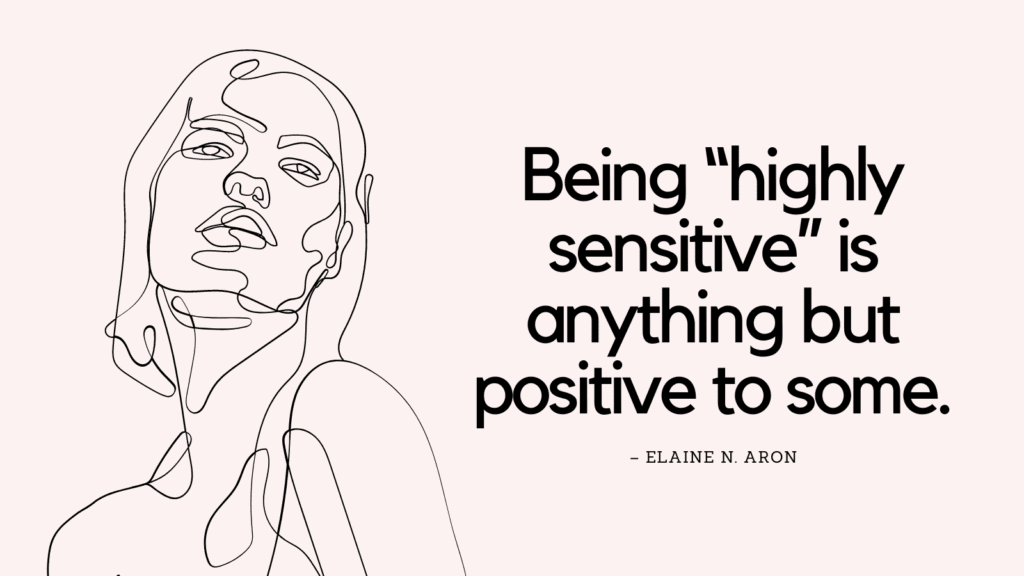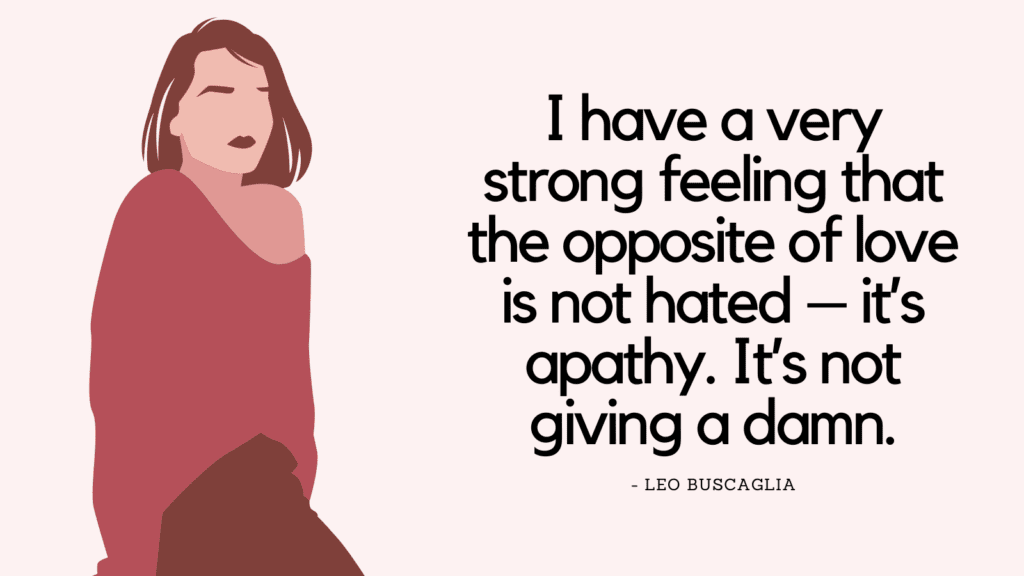This post contains some of the best highly sensitive person quotes.
Who Is The Highly Sensitive Person?
A highly sensitive person (HSP) is someone who has a genetic trait that makes them more aware and responsive to their environment, both physically and emotionally.
HSPs often experience sensory overload and may become overwhelmed by loud noises, strong smells, or bright lights. They may also be deeply affected by other people’s emotions and the energy of social situations.
According to psychologist Elaine Aron, who coined the term “highly sensitive person” in the 1990s, about 15-20% of the population has this trait.
HSPs tend to be empathic, intuitive, and creative, yet they often feel misunderstood or criticized by others who don’t share their sensitivity.
Being a highly sensitive person is not a disorder or a weakness, but rather a unique aspect of one’s personality.
HSPs can thrive and lead fulfilling lives by understanding and embracing their sensitivity, setting appropriate boundaries, and practicing self-care.
This may involve activities such as mindfulness, meditation, journaling, and seeking support from loved ones or a therapist who understands their sensitivity.
Highly Sensitive Person Quotes
1. “You may have always felt different than others—you feel more and you experience the world more vividly and more deeply, almost as if you’re encountering the world on a higher volume.” – Shahida Arabi
2. “…being “highly sensitive” is anything but positive to some.” – Elaine N. Aron
3. “All of your senses [are] on high alert … all of your emotions are magnified. A sadness is a deep sorrow and a joy is pure ecstasy. You also care beyond reason and empathize without limits. Imagine being in permanent osmosis with everything around you.” – Elaine N. Aron
4. “As an HSP, you have a highly tuned radar for everything happening around you. This trait makes you more prone to overstimulation, but it can also come with the many benefits of being extremely discerning in your interactions with others—once you learn to tune in to your heightened perceptions.” – Shahida Arabi
Related: How To Thrive As A Highly Sensitive Person? [HSP’s Survival Guide]
5. “As an HSP, you’ve probably been called “too sensitive” since you were a child. You may have also struggled with high levels of anxiety, depression, or even neuroticism.” – Shahida Arabi
6. “As HSPs, we internalize this form of shaming because we are so attuned to the emotions of others and are highly conscientious about how we make others feel. Unhealthy shaming and judgment from others affects us deeply, especially if we grew up in abusive households where we were taught that our worth was tied to gaining approval and pleasing others.” – Shahida Arabi
7. “Further, it is safe to say that everyone can become highly sensitive at times—for example, after a month alone in a mountain cabin. And everyone becomes more sensitive as they age. Indeed, most people, whether they admit it or not, probably have a highly sensitive facet that comes to the fore in certain situations.” – Elaine N. Aron
8. “Highly sensitive individuals are prone to experiencing intense emotions, especially in interpersonal situations that are distressing.” – Shahida Arabi
9. “Highly sensitive persons (HSPs) are in a unique position to encounter a wide variety of toxic people, because manipulators look for people with empathy, conscientiousness, and emotional responsiveness to exploit. Many who reached out to me experienced the high end of the toxicity spectrum, such as narcissistic, sociopathic, and psychopathic individuals. ” – Shahida Arabi
10. “HSPs and empaths are deeply intuitive individuals who are highly attuned to the emotions and energy of others. We experience this sense of emotional contagion on a heightened level.” – Shahida Arabi
Related: Top Resources For Highly Sensitive Person (Tests, Support Groups, Books, Workbooks, Blogs, etc.)
11. “HSPs and empaths form a unique and compassionate group of people who are frequently the target of relationship abuse.” – Shahida Arabi
12. “HSPs are not only attuned to other people, but we are also deeply connected to our environment. Research shows that HSPs have more activity in the part of the brain known as the insula, leading to a greater depth of processing, attunement to changes in the environment, and enhanced perception of experiences; HSPs also show a heightened awareness of subtle stimuli and are more reactive to both positive and negative stimuli.” – Shahida Arabi
13. “HSPs who are equipped with the tools to tackle conflict, engage in self-care, and deal effectively with toxic individuals can become empowered superheroes. ” – Shahida Arabi
14. “I’ve learned that toxic people and narcissists find it quite easy to convince a highly empathic and conscientious person that they are paranoid, losing it, or just “overreacting” when being manipulated. ” – Shahida Arabi
15. “If your childhood was rife with emotional neglect, abuse, or bullying, your high sensitivity can interact with these experiences to produce these issues in adulthood. “Nurture” interacts with “nature,” such that toxic early environments leave highly sensitive types more vulnerable to stress.” – Shahida Arabi
16. “Since highly sensitive individuals tend to make decisions based on their own sense of right and wrong, they are likely to project their own sense of morality and conscience onto the narcissist and assume that the narcissist, too, possesses that same degree of empathy for others.” – Shahida Arabi
17. “When you are highly empathic, you try to see the best in others and “help” those you think are hurting, especially if they use a pity ploy on you—any action that invites sympathy for the purpose of manipulation—to get you to see them as the victims when they are really the perpetrators.” – Shahida Arabi
Related: Top 6 Challenges For Introverts (& How to Overcome Them)
18. “You may be wondering why you would even get entangled with a malignant type in the first place. After all, as an HSP, you have nothing in common with a psychopathic individual. You are highly empathic; they are highly manipulative and destructive. Yet it is your greatest assets that often make you an appealing target for such a predator.” – Shahida Arabi
19. “When highly sensitive people (HSPs) conde about love, there is notable depth and intensity. They fall in love hard and they work hard on their close relationships. Yes, sometimes non-HSPs sound similarly enthralled and confused by love, but on the average, HSPs have a more soul-shaking underlying experience.” – Elaine N. Aron
20. “The highly sensitive person has an important mission, which is to serve as a balance to the more aggressive behavior of some of the non-HSPs who advocate a less than nurturing policy toward humans, animals, and Mother Nature.” – Ted Zeff
21. “Highly sensitive boys learn to deny their real selves in order to be accepted and approved by their peers. This denial can create fear, anxiety, and low selfesteem.” – Ted Zeff
22. “While following a morning routine is very important for the highly sensitive person, your evening routine is another essential component that will help you become more tranquil.” – Ted Zeff
23. “While some people find drinking alcohol relaxing, other highly sensitive people actually have an adverse reaction to even one alcoholic drink. Even if you think it’s “no big deal” to drink a glass of wine at dinner, it’s important to know your body’s reactions to alcohol and not just go along with the crowd.” – Ted Zeff
24. “Regardless of the strength of their immune system, highly sensitive people tend to experience illness more deeply and find themselves more upset when they are sick than non-HSPs. The HSP also has a lower threshold for pain than the non-HSP, making you more aware of illness in your body.” – Ted Zeff
25. “Every highly sensitive person is unique.” – Ted Zeff
Related: How To Become A Stronger Empath? Top 20 Actionable Empathy Exercises to Become More Empathetic




